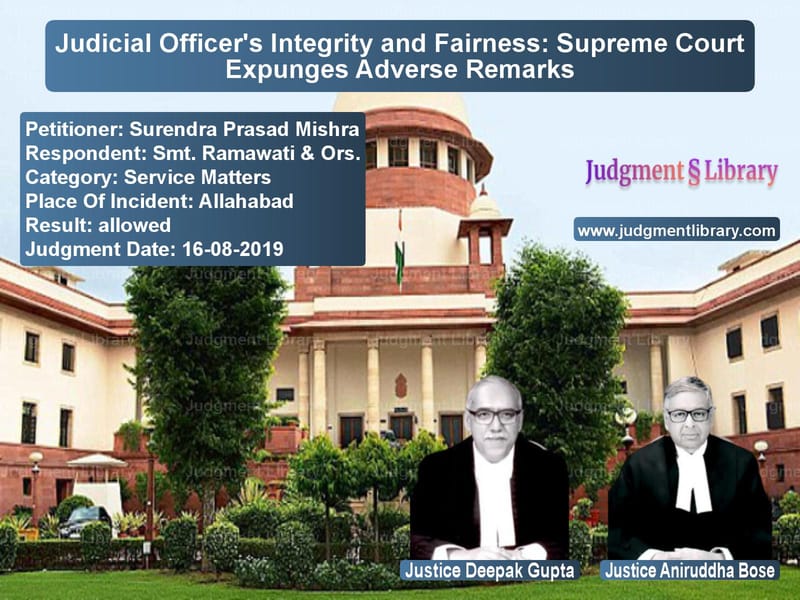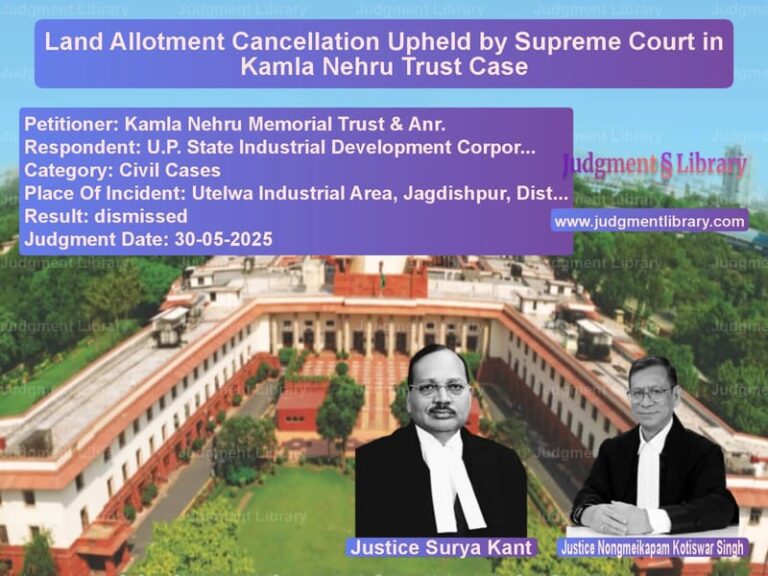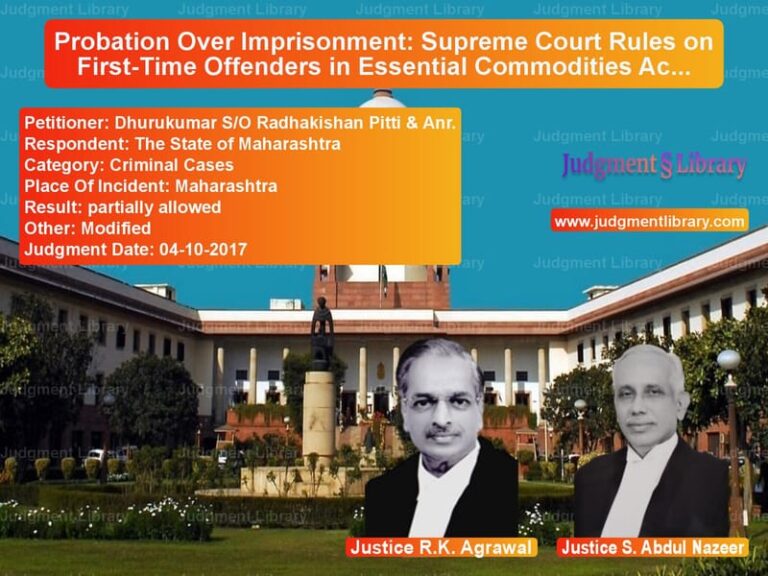Judicial Officer’s Integrity and Fairness: Supreme Court Expunges Adverse Remarks
The case of Surendra Prasad Mishra vs. Smt. Ramawati & Ors. revolves around the professional conduct of a judicial officer and the limits of judicial scrutiny regarding remarks against lower court judges. The Supreme Court’s ruling in this case serves as a critical precedent in protecting the dignity and fairness of the judicial process.
The core issue in this case was whether adverse remarks made by the High Court against a presiding judge in a Motor Accident Claims Tribunal (MACT) case should be expunged. The Supreme Court examined the matter and ruled that such remarks should be deleted, emphasizing that judges at all levels deserve respect and fair treatment.
Background of the Case
The appellant, Surendra Prasad Mishra, was a judicial officer serving as a judge in a Motor Accident Claims Tribunal. A claim petition was filed before him in which two lawyers, Mr. R.M. Singh and Mr. D.K. Saxena, had submitted their vakalatnamas to represent the claimant.
The case was eventually settled between the claimant and the insurance company. However, the settlement petition was signed and filed by only one of the lawyers, Mr. D.K. Saxena. At this point, Mr. R.M. Singh objected, stating that his legal fees had not been paid and demanding that the compromise petition should not be recorded.
The appellant-judge accepted Mr. R.M. Singh’s objection and ruled that the compromise petition could only be filed through him, not Mr. D.K. Saxena. The rationale provided was that since the vakalatnama bore a fee of Rs.10 for the Advocates Welfare Fund, it authorized only one lawyer and not two.
Petitioner’s Arguments (Surendra Prasad Mishra)
The appellant, a judicial officer, argued that:
- His decision was based on a reasonable interpretation of the vakalatnama, which he believed authorized only one lawyer to file documents.
- He had no personal interest in the dispute and merely acted to prevent a legal controversy between the two lawyers.
- The High Court had wrongly accused him of bias and questioned his integrity without substantial evidence.
- Scathing remarks against him in the High Court’s judgment had tarnished his professional reputation.
Respondents’ Arguments (Smt. Ramawati & Others)
The respondents contended that:
- The appellant had exceeded his jurisdiction by interfering in a dispute between two lawyers.
- It was not the role of the judge to settle disputes regarding legal fees or to determine which lawyer had the right to file documents.
- The High Court had rightly set aside the appellant’s order and taken corrective action.
High Court’s Decision
The High Court ruled that the appellant had wrongly favored one lawyer over the other and passed unnecessary orders, which led to delays in the claims process. In doing so, the High Court:
- Set aside the appellant’s order that required the compromise petition to be filed only by Mr. R.M. Singh.
- Made serious allegations against the appellant, suggesting that he acted with bias and favoritism.
- Referred the matter to the administrative side for disciplinary action.
- Imposed a cost of Rs.10,000 on the appellant.
Supreme Court’s Observations
The Supreme Court critically analyzed the High Court’s decision and made the following observations:
- Judicial officers are required to make legal decisions in good faith, and mere errors in judgment do not warrant accusations of bias.
- While the appellant’s order may have been legally incorrect, the High Court’s remarks questioning his integrity were unwarranted.
- It is not appropriate for higher courts to pass strictures against lower court judges without strong evidence of misconduct.
- Judicial officers work under challenging conditions, and their judgments are subject to scrutiny through appeals and revisions, not personal criticism.
Key Ruling and Verdict
The Supreme Court ruled in favor of the appellant and provided the following relief:
- All adverse remarks made by the High Court against the appellant were expunged.
- Paragraph 15 of the High Court’s judgment, which contained critical observations about the appellant’s integrity, was deleted in its entirety.
- The imposition of Rs. 10,000 as costs on the appellant was set aside.
- It was emphasized that judges must exercise restraint in making observations that could damage the careers of lower court judges.
The Supreme Court referred to previous judgments, highlighting the importance of maintaining judicial decorum:
“The higher courts every day come across orders of the lower courts which are not justified either in law or in fact and modify them or set them aside. Our legal system acknowledges the fallibility of the judges and hence provides for appeals and revisions. A judge tries to discharge his duties to the best of his capacity. While doing so, sometimes, he is likely to err.”
Implications of the Judgment
This judgment serves as a crucial precedent in protecting judicial officers from undue criticism. It highlights:
- The necessity for higher courts to be cautious in making adverse remarks against lower court judges.
- The importance of due process in evaluating judicial conduct.
- The role of the administrative side of the judiciary in handling disciplinary matters, rather than open criticism in judgments.
- The principle that errors in judgment should be corrected through appeals, not through public condemnation of judges.
The Supreme Court’s decision ensures that while judicial officers remain accountable, they are also protected from undue scrutiny that may harm their professional integrity. This case sets a vital legal standard for maintaining fairness and dignity in judicial proceedings.
Petitioner Name: Surendra Prasad Mishra.Respondent Name: Smt. Ramawati & Ors..Judgment By: Justice Deepak Gupta, Justice Aniruddha Bose.Place Of Incident: Allahabad.Judgment Date: 16-08-2019.
Don’t miss out on the full details! Download the complete judgment in PDF format below and gain valuable insights instantly!
Download Judgment: Surendra Prasad Mish vs Smt. Ramawati & Ors. Supreme Court of India Judgment Dated 16-08-2019.pdf
Direct Downlaod Judgment: Direct downlaod this Judgment
See all petitions in Disciplinary Proceedings
See all petitions in Judgment by Deepak Gupta
See all petitions in Judgment by Aniruddha Bose
See all petitions in allowed
See all petitions in supreme court of India judgments August 2019
See all petitions in 2019 judgments
See all posts in Service Matters Category
See all allowed petitions in Service Matters Category
See all Dismissed petitions in Service Matters Category
See all partially allowed petitions in Service Matters Category







